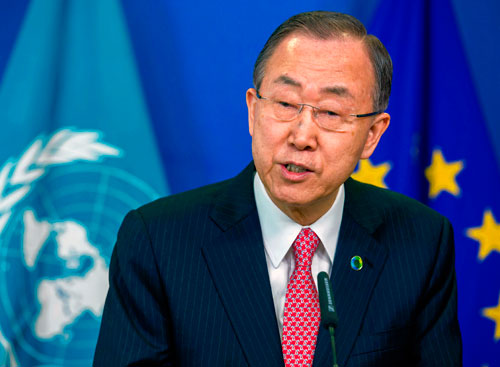As the world on Tuesday marked International Anti-Corruption Day, the United Nations and the Organization of American States (OAS) have called on the Caribbean and other countries in the international community to reaffirm their commitment to the fight against corruption.
In his message to mark the Day, United Nations Secretary-General Ban Ki-moon said the fight against corruption is “a global concern requiring the broadest possible response to dismantle its high walls.
“To dismantle corruption’s high walls, I urge every nation to ratify and implement the U.N. Convention against Corruption,” said Ban, underscoring that while the treaty’s ground breaking measures in the areas of prevention, criminalization, international cooperation and asset recovery have made important inroads, “there is much more to do.”
The U.N. said the theme of the 2014 International Day, “Breaking the Corruption Chain,” is geared towards showing the importance of individual engagement in tackling a phenomenon “that strikes hardest at the poor, hinders inclusive economic growth and robs essential services of badly needed funds.”
“From cradle to grave, millions are touched by corruption’s shadow,” said Ban, urging engagement of the public and private sectors.
“Public servants and elected officials had to be guided by ethics, transparency and accountability, while the private sector needed to recognize that good behavior is good business,” he added.
Looking ahead to agreement on a new post-2015 sustainable development agenda, Ban emphasized how the new agenda would promote better practices.
“Our aim is to empower individuals and catalyze governments, the private sector and civil society to help lift millions out of poverty, protect the planet and achieve shared prosperity and dignity for all,” he said, adding that “eliminating corruption and its harmful impacts will be crucial to our future well-being.”
Yury Fedotov, Executive Director of the U.N. Office on Drugs and Crime, also said: “Corruption, today, represents a serious brake on the forward motion of sustainable development and building effective institutions.
He added that corruption “oils the wheels of other damaging crimes, including illicit trafficking in drugs, people, animals, timber and guns.”
OAS Secretary General, José Miguel Insulza, also recognized International Anti-Corruption Day with a call on Caribbean and other countries to reaffirm their commitment to the fight against corruption.
He said it was necessary to “jointly tackle this problem that affects us all and that we must all work together to solve.”
Insulza recalled that the OAS contributed the first international legal instrument on the issue, the Inter-American Convention against Corruption.
He said the OAS has continued in its policy of helping member-states to improve their legal frameworks to address the problem and to strengthen the institutions charged with applying them, through the Follow-up Mechanism to the Convention (MESICIC).
Among the works carried out by the mechanism are the rounds of “inter pares” analysis dealing with 30 countries of the region, “which have addressed the improvement of provisions essential to the prevention of conflicts of interests, safeguarding public funds, punishing corrupt practices and achieving transparency in government procurement and the hiring of public servants,” Insulza said.
“Conscious that the fight against corruption does not rest solely with public authorities, the MESICIC has involved civil society organizations, the private sector, professional and academic bodies and researchers, giving them ample opportunity to participate and express their opinions,” he said.
The OAS chief said all nations “have a very important role to play, given the transnational nature of corruption.”
























